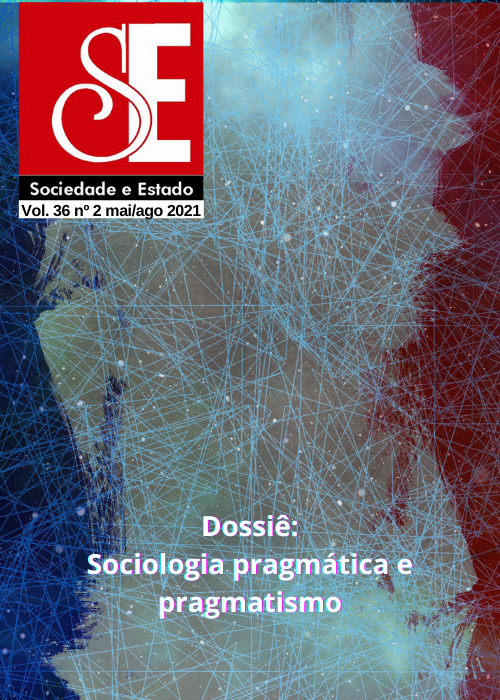Environmental Sociology: a new paradigm
Keywords:
Environmental SociologyAbstract
Ostensibly diverse and competing theoretical perspectives in sociology are alike in their shared anthropocentrism. From any of these perspectives, therefore, much contemporary and future social experience has to seem anomalous. Environmental sociologists attempt to understand recent societal changes by means of a nonanthropocentric paradigm. Because ecosystem constraints now pose serious problems both for human societies and for sociology, three assumptions quite different from the prevalent Human Exceptionalism Paradigm (HEP) have become essential. They form a New Environmental Paradigm (NEP). Sociologists who accept this New Environmental Paradigm have no difficulty appreciating the sociological relevance of variables traditionally excluded from sociology. The core of environmental sociology is, in fact, study of interactions between environment and society, recent work by NEP-oriented sociologists on issues pertaining to social stratification exemplifies the utility of this paradigm.
Downloads
References
ALBERCHT, S. L.; MAUSSA, A. L. The environment as a social problem. In: MAUSS, A. L. Social Problems as Social Movements. Philadelphia: J.B. Lippincott Co, 1975. p. 556 – 605.
ALLEN, W. R. Scarcity and order: The Hobbesian problem and the Human resolution. Social Science Quarterly, v. 57, p. 263 – 275. 1976.
ANDERSON C. H. The Sociology of Survival: Social Problems of Growth Homewood. Illinois: Dorsey, 1976.
ARONOWITZ, S. Food, Shelter and the American Dream. New York: Seabury Press, 1974.
BELL, D. The Coming of Post-Industrial Society. New York: Basic Books, 1973.
BURCH JR, W. R. Daydreams and Nightmares: A Sociological Essay on the American Environment. New York: Harper and Row, 1971.
______. The peregrine falcon and the urban poor: Some sociological interrelations. In: RICHERSON, P. J.; MCEVOY, J. (Ed.). Human, Ecology an Environmental Approach. Duxbury, 1976. p. 308 – 316.
BUTTEL, F. H. Social science and the environment competing theories. Social Science Quarterly, v. 57, p. 307 – 323. 1976.
CARSON, R. Silent Spring. Boston: Houghton-Mifflin, 1962.
CATTON JR, W. R. Toward prevention of obsolescence in Sociology. Sociological Focus, v. 9, p. 89 – 98. 1976a.
______. Why the future isn’t what it used to be (and how it could be made worse than it has to be). Social Science Quarterly, v. 57, p. 276 – 291. 1976b.
COMMONER, B. The Closing Circle. New York: Knopf, 1971.
DALY, H. E. The steady-state economy: Toward a political economy of biophysical equilibrium and moral growth. In: ______. (Ed.) Toward a Steady-State Economy. São Francisco, W. H. Freeman, 1973.
DENISOFF, R. S.; CALLAHAN, O.; LEVINE, M. H. (Ed.) Theories and Paradigms in Contemporary Sociology. Illinois: Peacock, 1974.
DUNLAP, R. E. (Ed.) Circular n. 586. Directory of Environmental Sociologists. Pullman: Washington State University, College of Agriculture Research Center, 1975.
DUNLAP, R. E.; CATTON JR, W. R. Environmental Sociology. Annual Review of Sociology. Palo Alto: Annual Reviews Inc., v. 5, p. 243 – 273. 1979.
DUNLAP, R. E.; VAN LIERE, K. D. The “new environmental paradigm”: A proposed measuring instrument and preliminary results. In: Encontro Anual da Associação Sociológica Estadunidense. Chicago, 1977.
EHRLICH, P. R. EHRLICH, A. H. Population, Resources, Environment. São Francisco: W. H. Freeman, 1970.
FRIEDRICHS, R. W. A Sociology of Sociology. New York: Free Press, 1972.
GOULDNER, A. W. The Coming Crisis of Western Sociology. New York: Basic Books, 1970.
HARDIN, G. The tragedy of the commons. Science, v. 162, p. 1243 – 1248. 1968.
HAWLEY, A. H. (Ed.) Man and Environment. New York: New York Times Company, 1975.
HOROWITZ, I. L. Three Worlds of Development: The Theory and Practice of International Stratification. 2 ed. New York: Oxford University Press, 1972.
HUMPHREY, C. R.; BUTTEL, F. H. New directions in environmental sociology. In: Encontro Anual da Sociedade para os Estudos dos Problemas Sociais. New York, 1976.
KLAUSNER, S. Z. On Man in His Environment. São Francisco: Jossey-Bass, 1971.
KUHN, T. S. The Structure of Scientific Revolutions. Chicago: University of Chicago Press, 1962.
MANDERSCHEID, R. W. (Ed.) Annotated Directory of Members Ad Hoc Committee on Housing and Physical Environment Adelphi. Maryland: Mental Health Study Center, 1977.
MICHELSON, W. H. Man and His Urban Environment. 2 ed. Massachusetts: Addison-Wesley, 1976.
MORRISON, D. E. The environmental movement: Conflict dynamics. Journal of Voluntary Action Research, v. 2, p. 74 – 85. 1973.
______. Growth, environment equity and scarcity. Social Science Quarterly, v. 57, p. 292 – 306. 1976.
______. Equity impacts of some major energy alternatives. In: Encontro Anual da Associação Sociológica Estadunidense. Chicago, 1977.
PARSONS, T. The Evolution of Societies. Englewood Cliffs: Prentice-Hall, 1977.
POTTER, D. M. People of Plenty. Chicago: University of Chicago Press, 1954.
RITZER, G. Sociology: A Multiple Paradigm Science. Boston: Allyn and Bacon, 1975.
SCHNAIBERG, A. Environmental sociology and the division of labor. [Memeógrafo]. Evanston: Departamento de Sociologia, Northwestern University, 1972.
______. Social synthesis of thee societal environment dialect: The role of distributional impacts. Social Science Quarterly, v. 56, p. 5 – 20. 1975.
STRUMPEL, B. (Ed.) Economic Means for Human Needs. Ann Arbor: Ann Arbor Institute for Social Research, University of Michigan, 1976.
SUMNER, W. G. Earth hanger or the philosophy of land grabbing. In: KELLER, A. G. (Ed.) Earth Hunger and Other Essays. New Haven: Yale University Press, p. 31 – 64. 1913.
VAN BAVEL, C. H. M. Soil and Oil. Science, v. 197, p. 213. 1977.
ZEISEL, J. Sociology and Architectural Design. New York: Russel Sage Foundation, 1975.
ZEITLIN, M. (Ed.) American Society, Inc. 2 ed. Chicago: Rand McNally, 1977.
Downloads
Published
How to Cite
Issue
Section
License
Copyright (c) 2021 Sociedade e Estado

This work is licensed under a Creative Commons Attribution-NonCommercial 4.0 International License.




.jpg)



















